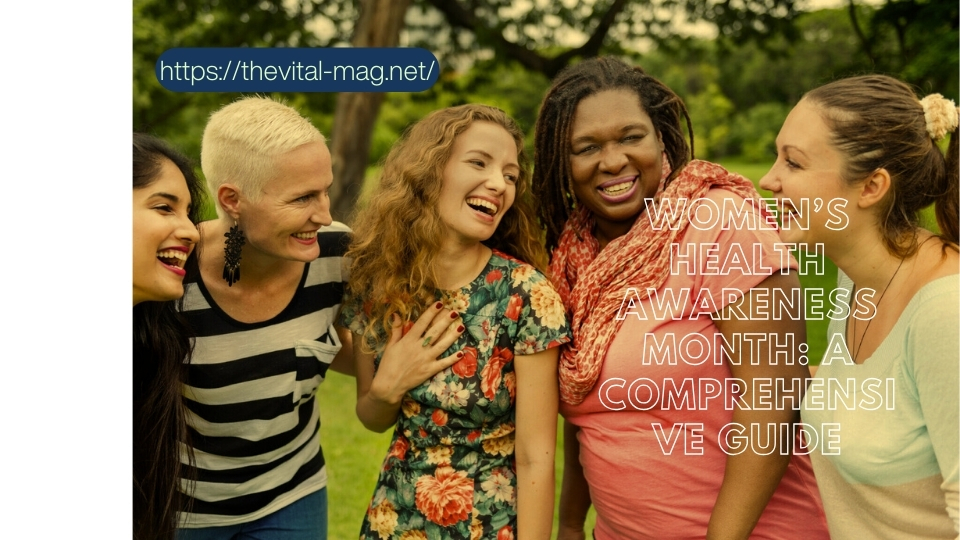Introduction
Hey there! Did you know Women’s Health Awareness Month is more than a calendar reminder? It’s a dedicated time for us to focus on the unique health challenges we women face every day. This month is about prioritizing our health. We should seek information and use resources that support our well-being. So, why is this month so important? It covers various health topics, from mental to reproductive health. Plus, it’s a nudge for me and all of us to seek medical guidance and support when we need it. Let’s jump right in!
Key Points
- What is Women’s Health Awareness Month? It’s a month set aside to promote awareness of health issues affecting women and to encourage preventive care.
- Common Health Issues: This month highlights many women’s health issues, including heart disease, breast cancer, and mental health concerns.
- Available Resources: There are tons of wellness resources out there to help women like me navigate our health journeys!
The History of Women’s Health Awareness Month
So how did it all begin? Launching Women’s Health Awareness Month to raise awareness of our unique health challenges. It has been an important opportunity for education and support over the years.
- Establishment and development: Initially focused on reproductive health issues in the 1980s, it has now expanded to include mental health and chronic illness…
- Support Milestones: Key achievements in support of women’s health include: Better health care policies. Access to care and increased awareness of women’s unique health needs
Creating the Office of Women’s Health at the U.S. Department of Health and Human Services is an important step forward. It plays a key role in developing women’s health initiatives.

Common Health Issues Women Face
When I think about women’s health, several conditions appear more frequently than others. Here are some of the big players:
| Health Issue | Description |
| Heart Disease | Leading cause of death for women. |
| Breast Cancer | About 1 in 8 women will be diagnosed in their lifetime. |
| Reproductive Health Issues | Conditions like endometriosis and PCOS affect many women. |
| Mental Health Disorders | Women are more likely than men to experience anxiety and depression. |
| Osteoporosis | Women are at higher risk, particularly post-menopause. |
Statistics show that nearly 50% of women report having at least one chronic condition. It’s important for me to stay informed and proactive about my health!
Importance of Regular Health Check-Ups
Regular check-ups are a lifesaver for me! They help catch potential issues early. Here’s why routine screenings matter:
| Screening Type | Recommended Age Group |
| Pap Tests | Start at age 21. |
| Mammograms | Begin at age 40; frequency depends on risk factors. |
| Cholesterol Checks | Start at age 20 and continue every 4-6 years. |
| Blood Pressure Checks | Every 1-2 years for most women, more frequently if at risk. |
| Bone Density Tests | Recommended for women over 65, or younger if at risk. |
Being proactive about my health through regular screenings can help me catch issues before they become serious.
Mental Health Awareness
Let’s talk about mental health; it is as important as physical health! I know the connection is strong; poor mental health can lead to physical problems and vice versa. Green moral health Problems poignant women admit anxiousness and low. The National Institute of Mental Health says women are more at risk for mental health problems than men. Then we have fire consciousness. Here are some mental health stats relevant to women:
| Mental Health Condition | Prevalence in Women (%) |
| Anxiety Disorders | 23.4% |
| Major Depressive Disorder | 8.7% |
| Post-Traumatic Stress Disorder (PTSD) | 10.4% |
| Eating Disorders | 3.8% |
It is extremely important for me and other women to seek help when needed. Whether done therapy back groups or but sound to friends it sanctions running alongside others
Nutrition and Diet
What I eat truly matters! Balanced nutrition for women is key to maintaining energy and overall health. Here are some dietary guidelines I like to follow:
| Food Group | Recommendation |
| Fruits and Vegetables | Aim for at least five servings a day. |
| Whole Grains | Choose whole grains over refined grains. |
| Healthy Fats | Incorporate sources of healthy fats like avocados and nuts. |
| Lean Proteins | Include sources like chicken, fish, beans, and legumes. |
| Dairy or Alternatives | Opt for low-fat or fat-free options. |
Maintaining a balanced diet helps me feel best and supports my overall health.

Exercise and Physical Activity
Regular exercise is like magic for my health! It boosts my mood, helps with weight management, and reduces the risk of chronic conditions. Here are some fun ways I get moving:
| Activity Type | Suggestions |
| Cardio | Walking, running, dancing. |
| Strength Training | Lifting weights or bodyweight exercises. |
| Flexibility | Yoga or stretching exercises to keep me limber! |
| Recreational Sports | Join a local league for activities like soccer or volleyball. |
Here’s a fun fact: Just 30 minutes of moderate exercise daily can significantly improve my health. I love finding ways to stay active that I actually enjoy!
Reproductive Health
Reproductive health is a huge part of my focus during Women’s Health Awareness Month. Common issues can include menstrual disorders and menopause. I find resources for sexual and reproductive health, like Planned Parenthood, very helpful. Here’s a summary of some reproductive health issues:
| Issue | Description |
| Menstrual Disorders | Conditions like PMS and irregular periods. |
| Menopause | The transition that many women experience affects physical and mental health. |
| Fertility Issues | Challenges that can arise for women trying to conceive. |
| STIs | Importance of regular testing and safe practices. |
Being informed about reproductive health empowers me to make the best choices for my body.
Maternal Health
Pregnancy is a beautiful journey. But it comes with challenges. Maternal health care is critical to a healthy pregnancy and postpartum recovery. This is what I think about maternal health.
| Aspect | Importance |
| Prenatal Care | Essential for monitoring the health of both mother and baby. |
| Postpartum Support | Important for mental and physical recovery. |
| Nutrition During Pregnancy | Vital for the development of the baby. |
| Breastfeeding Support | Resources available to help new mothers succeed. |
I’ve found that local parenting groups can be fantastic for support during this time!
Chronic Conditions
Chronic conditions can affect my quality of life, but I know I can manage them! Common conditions like diabetes and arthritis must regular monitoring and a proactive approach. Here are some strategies I use for management:
| Strategy | Description |
| Regular Check-Ups | Staying on top of my health is key! |
| Healthy Lifestyle | Incorporating a balanced diet and regular exercise. |
| Medication Management | Following the prescribed medication plan diligently. |
| Support Groups | Connecting with others who understand my challenges. |
Managing chronic conditions can be tough, but having a strong support system helps me stay on track.
Access to Healthcare
Many women face barriers to accessing healthcare, such as cost and availability. Resources like community health clinics can provide essential services at lower costs, which I find helpful. Here are some barriers faced by women:
| Barrier | Description |
| Cost of Care | High medical bills can deter women from seeking help. |
| Lack of Insurance | Without insurance, accessing care can be challenging. |
| Transportation Issues | Difficulty getting to appointments can be a barrier. |
| Cultural Barriers | Language and cultural differences can impact access. |
Awareness of these barriers helps me understand the importance of advocating for better access to healthcare for all women.
Health Education Resources
Here’s a short list of resources I recommend for women’s health education:
| Organization | Focus |
| American Heart Association | Focused on heart health, offering resources and support. |
| National Women’s Health Network | Advocacy and education on women’s health issues, including policy changes. |
| Planned Parenthood | Provides sexual and reproductive health services and education. |
| Office on Women’s Health | Advocacy and education on women’s health issues, including policy changes. |
| Women’s Health Foundation | Focused on improving women’s health through education and research. |
These organizations provide information that helps me stay informed and connected to my health needs.
Role of Technology in Women’s Health
Technology is a game changer for women’s health! Telemedicine and health apps provide better access to care. I find it very convenient to consult with a healthcare provider from my home. Here’s how technology is making a difference.
| Technology Type | Description |
| Telemedicine | Virtual appointments allow me to see my doctor without traveling. |
| Health Apps | Apps that track my menstrual cycle, exercise, and nutrition. |
| Wearable Technology | Devices like fitness trackers monitor my physical activity and health stats. |
| Online Support Groups | Platforms where women can connect and share experiences. |
These tools empower me to take charge of my health and stay connected to my healthcare providers.
Advocacy and Support Groups
Advocacy plays a massive role in improving women’s health. I’ve found that support groups can be a lifeline for many of us, providing community and shared experiences. Here’s a look at some advocacy and support groups available:
| Group | Focus |
| National Organization for Women (NOW) | Advocates for women’s rights and health issues. |
| Sister to Sister | Focuses on heart health awareness among women. |
| Postpartum Support International | Offers support for mothers experiencing postpartum depression. |
| The American Cancer Society | Provides resources for women dealing with cancer and its treatments. |
Being part of these groups helps me feel supported and connected to others facing similar challenges.

Stories of Resilience
Let’s celebrate the amazing women who have overcome health challenges. Their stories inspire me to move forward! Here are some testimonials from women who have gone through their own health journeys.
- Maria, age 34: “After doctors diagnosed me with breast cancer, I found strength that I never knew before. I joined a support group. And it helps me know that I’m not alone. My journey has proven that I can handle whatever life throws.”
- Jennifer, age 28: “Living with PCOS is challenging. But I have learned to advocate for my own health. I changed my diet and started exercising. And now I am empowered to manage my symptoms well.”
- Lisa, age 42: “I had postpartum depression and felt hopeless. But I’m asking for help. I joined a support group and regained my sense of self over time. Now I’m sharing my story to help other women. Know that they are not alone.”
Stories like these remind us of our strength and the importance of supporting one another.
Women’s Health Policy
Current policies impacting women’s health are important for access and rights. Discussions about future directions for women’s health legislation are ongoing, and I think it’s essential for all of us to stay informed and involved. Here’s a look at some key policy areas:
| Policy Area | Description |
| Affordable Care Act | Aims to provide affordable health insurance to women. |
| Reproductive Rights | Policies that protect women’s rights to make decisions about their bodies. |
| Maternal Health Initiatives | Efforts to reduce maternal mortality rates and improve care for pregnant women. |
| Mental Health Parity | Policies that protect women’s rights to make decisions about their bodies. |
Engaging in these discussions helps me understand how policy affects my health and other women’s health.
Conclusion
Women’s Health Awareness Month is a powerful reminder for me and all of us. Let’s order our health and beat the back we take. I learned a lot about being proactive about my health. This calendar month, let’s keep away support break healthcare for women. We must understand the common problems they face. Let’s go back to the health of those around America. Remember, we can be healthy and happy. Then let’s set it and broadcast the articulate existence knowledgeable around women’s health Problems not but helps me just to help those around you to work sound. Let’s share our story. Back apiece different and get our health amp precedence. Here’s a month to recognize, educate and celebrate women’s health!
Read Also: 20 Journaling Prompts for Mental Health
FAQs
What is Women’s Health Awareness Month?
A time to raise awareness of women’s health issues and promote preventive care.
Why is mental health important for women?
It harms women’s well-being, affecting their daily lives and responsibilities.
How can women improve their health?
By prioritizing check-ups, a balanced diet, exercise, and mental health support.
What should women do if they face barriers to healthcare?
Find community health resources. Advocate for their needs. Connect with support groups to help navigate challenges.






